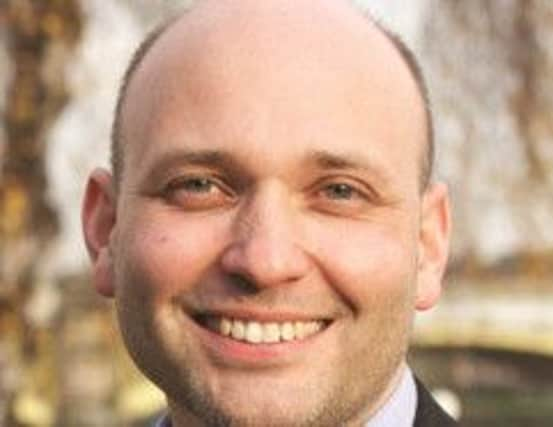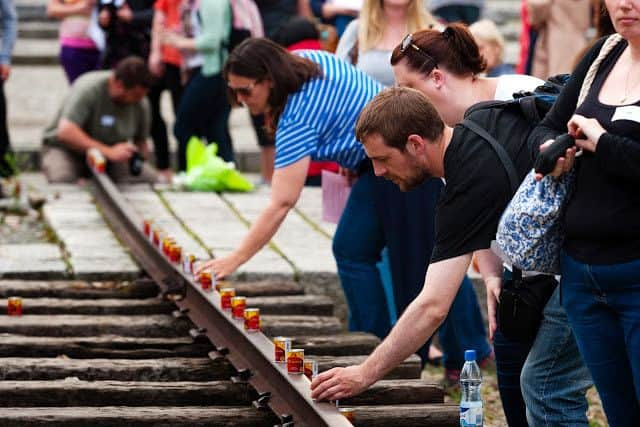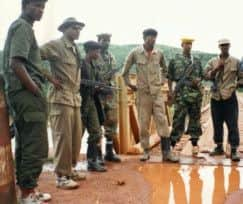Learning the lessons of the past


More than 20,000 students travel from around the country to the National Holocaust Centre and Museum, near New Ollerton, each year to learn about atrocities committed during the Second World War - not just from the centre’s extensive exhibitions and resources, but first hand from Holocaust survivors.
And the contribution of the National Holocaust Centre and Museum, established in 1995, was finally recognised in the New Year’s Honours list, with co-founder Dr James Smith (above) being awarded the CBE.
Advertisement
Hide AdAdvertisement
Hide AdFor brothers James and Stephen, both doctors, their journey started during a visit to the national Holocaust Museum in Israel while at university, and a need to raise awareness of the Holocaust amongst young people in Britain.


Modest plans to create a small exhibition in the family home soon grew into a national resource which accommodates hundreds of school children each week.
But the Holocaust Centre is only half the story, with both James and Stephen extending their focus and forming the Aegis Trust international charity, in response to genocide in Rwanda and ethnic cleansing in Balkans in the early 1990s. “Stephen and I were concerned after we came back from a trip to the Holocaust museum in Israel,” James told Chad.
“Was this really a freak of history - a one-off event in a terrible war, or was this potentially a precedent?
Advertisement
Hide AdAdvertisement
Hide Ad“If it had happened once to the Jews and the gypsies then could it happen again to somebody else somewhere else? The fact that human civilisation could descent to that level of barbarity had to be a warning of some kind.


“Something like this could happen within living memory and not be taught in our schools.
“Over the next year or so we continued to discuss this. We kept questioning why the Government hadn’t built a museum in the UK or why there isn’t more widespread education and we thought about how we could connect with other organisations in Europe.
“We were both in our early 20s, I was about to graduate from medical school, and Stephen said well why don’t we do something ourselves in a small way.
Advertisement
Hide AdAdvertisement
Hide Ad“We’d grown up in this house and our parents had been running a conference retreat centre largely for people in the church - our father being a minister in the Methodist Church and our mother being a teacher - and we were going to take over a couple of the rooms, maybe put up a small exhibition and invite some of the local schools. Just do something and it was going to be done in our spare time.”
But neither really appreciated the magnitude the journey they were starting on, and the people they would meet who would become life-changing.
As time went by we started to meet with survivors, we went to Europe - visited sites of the holocaust there - concentration, labour camps, former Jewish communities and began to get a sense of the scale and the magnitude of what happened,” James said.
“I think for those of us that haven’t been there, you can’t understand the magnitude and real enormity of what happened during that period but as we began to get a glimpse of the meaning and significance to European civilisation we wanted to do something more.
Advertisement
Hide AdAdvertisement
Hide Ad“We wanted to have a place for education - but ongoing and sustained education. More than that we felt it was important that there was somewhere where survivors could come and remember their loved ones with some measure of dignity and so the gardens were developed.
“By 1995 the centre opened its doors and schools started to visit in growing numbers and today we have 20-25,000 students visit each year.
“We then added another permanent exhibition for primary children, which doesn’t go into the horrors of the holocaust but talks about the persecution of Jews and the story of children who fled and escaped.
“The whole vision of the centre is that it will fulfil three particular functions. It will keep alive the memory of the Holocaust, particularly as a place of memorial for survivors. Secondly, it’s a place of education, where young people can interact with survivors and learn not only about them but learn from them. Thirdly, it is there to ask the question: what kind of society do we want to develop and live in?”
Advertisement
Hide AdAdvertisement
Hide Ad“I feel we all have a responsibility in one way another to make the world a little bit of a better place and a safer place to live in. This is the real lesson of the Holocaust. It could not have happened because Hitler or the elite Nazis decided that they were going to commit genocide, destroy all the Jews.
“It couldn’t happen with them alone. It needed the co-operation of a vast number of people, educated people and other massive sections of the population to turn a blind eye.
“So by 1941 it was almost impossible to stop the mass murder that was taking place. But at an earlier stage, if you went back to the point where these policies were developing then perhaps something could have happened.
“There are examples of people trying to do this. With the euthanasia programme, there were protests as late as 1941 and the programme was closed down.
Advertisement
Hide AdAdvertisement
Hide Ad“People who were protesting about it were not carted off and killed in the way that you might expect. If people in such times of terror can make a stand, how much more can we in our free and democratic lives help others to live with greater equality.
“It’s much easier for us to do that. We have a duty to protect our own nations from sliding into this brutality.”
Last month it was announced that James was being made a Commander of the Order of the British Empire (CBE) in the New Year Honours by Her Majesty the Queen.
One level below a knighthood, the CBE is awarded for prominent, distinguished and innovative contributions in any given field, and James immediately dedicated it to all the Holocaust and genocide survivors who have played a part in both the Holocaust Centre and Aegis.
Advertisement
Hide AdAdvertisement
Hide AdJames’ recognition was immediately praised by locally based Holocaust survivors who give up their free time to speak to children about their lives and experiences during the Second World War.
But he was quick to praise the work they do and the contribution they make as instrumental to the success of the centre.
He said: “Survivors have played a central role in the development of the centre. Personally, hearing their stories and meeting them had a profound impact on my whole perception of the world in which we live - both to the extent in which the Holocaust, genocide and persecution are possible, but also the remarkable fortitude they have in their survival.
“They come through this not with anger and resentment at the world, but with fortitude to share their stories with us when they could be living in retirement. They are doing what they can to make the world a better place, to ensure people don’t have to suffer what they suffer. The Holocaust centre simply wouldn’t be there without them.
Advertisement
Hide AdAdvertisement
Hide Ad“Every single child that comes here has had the privilege of meeting with a holocaust survivor who gets up in the morning and comes and shares painful memories with other people, so we owe them a massive debt of gratitude.”
After the launch of the Holocaust Centre, James and Stephen expanded their work, after atrocities in Rwanda and the Balkans led them to the conclusion that remembering the past alone was not enough.
During the Kosovo crisis in 1999, they launched the East Midlands Kosovo Appeal – and James became an area co-ordinator for the International Medical Corps in Albania for several months.
Talking to refugees and investigating factors which led to the ethnic cleansing he saw that mass atrocities or genocide do not occur spontaneously.
Advertisement
Hide AdAdvertisement
Hide AdJust as with diseases, if the risk factors can be identified then genocide too should be preventable. So in 2000 they launched the Aegis Trust for genocide prevention.
Aegis stresses the importance of remembering the past but also emphasizes research and learning to help create resilience against genocide at a community level.
It campaigns to prevent mass atrocities where they are threatened, and supports survivors and communities to rebuild after genocide.
Today the charity has offices in the US, UK and Rwanda, where it has been responsible for the Kigali Genocide Memorial since establishing it at the request of Rwandan authorities in 2004.
Advertisement
Hide AdAdvertisement
Hide AdSited where some 250,000 genocide victims lie buried, the memorial hosts tens of thousands of visitors each year, from Rwandan school students to international celebrities and politicians.
PICTURED: From top, Dr James Smith, young people taking part in a memorial service for Holocaust victims and Rwandan rebel fighters during the conflict in the 1990s.